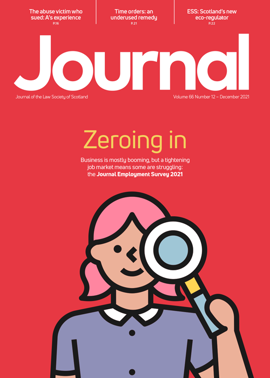Intellectual property: IP and AI – the latest
At Journal, June 2021, 32, I examined how artificial intelligence (“AI”) might interplay with intellectual property laws in the UK. Much has happened since I last reported on this. Since then, we have had the Thaler rulings in the UK, Australia and South Africa, and the Government has launched a new AI strategy which has a particular focus on amendments to patent and copyright law. This article will look at the new AI and IP landscape in the UK, and discuss whether the new developments are enough to keep the UK ahead of the curve.
The Thaler case that we covered in June has since been to the Court of Appeal (Thaler v Comptroller-General of Patents, Designs and Trade Marks [2021] EWCA Civ 1374 (21 September 2021)), which ruled that AI cannot be the inventor of new patents. This echoes the earlier decision from the High Court. However, this decision contrasts with the recent Australian and South African court rulings that AI systems can be recognised as the inventor for patent purposes.
The Court of Appeal decision follows the current UK patent law that requires an “inventor” to be a natural person. It is interesting to note that there was a split in the judgments between two of the three judges, both leading authorities on UK patent law. Lord Justice Birss’s dissenting judgment held that just because we had not come across a situation like this before, did not prevent the court from deciding how the law should be applied in a new situation. It is likely that this case will go on to reach the Supreme Court, a decision from which could expedite a change of UK legislation.
A national strategy
Also in September, we saw the publication of the Government’s National AI Strategy, which considers how the UK can maintain its position as a global superpower in AI and secure its place as a research and innovation powerhouse while retaining global talent and a progressive regulatory and business environment. The strategy is based on three assumptions. First, that progress, discovery and strategic advantage in AI depends on access to people, data, compute (computing power) and finance. Secondly, that AI will become mainstream in much of the economy and action needs to be taken to ensure that every sector and region of the UK benefits from that. Finally, that the UK governance and regulatory regimes need to keep pace with the fast-changing demands of AI.
The National AI Strategy outlines the Government’s plans to support the international development of AI governance by working with partners to shape approaches to AI governance under development, such as the Artificial Intelligence Act (“AI Act”) proposed by the EU. If the AI Act was implemented, it would introduce specific, risk-based rules for AI into EU law. Since Brexit, the Act would no longer directly apply to the UK; however it appears that the Government may introduce reflective change via our own legislation.
How the law might change
More recently, the UK’s Intellectual Property Office (“IPO”) has started a consultation on AI and IP. In particular, the IPO is seeking evidence and views on both the extent to which patents and copyright should protect inventions and creative works made by AI, and measures to make it easier to use copyright protected material in AI development, supporting innovation and research.
The IPO has stated that “any measures we put in place should: encourage innovation in AI technology and promote its use for the public good; preserve the central role of intellectual property in promoting human creativity and innovation; be based on the best available economic evidence”.
This consultation seeks views on a range of possible amendments to patent and copyright law. Proposals include the possibility of a new form of IP right which could protect AI devised inventions (with perhaps a stricter test of inventive step because AI may invent in ways which a human inventor would not, and possibly a shorter term than the current 20 years that patents can be applied for).
Also under review is the possibility of removing the copyright protection currently available for computer generated works; and whether UK patent law should be amended to include a human responsible for an AI system as an inventor. The consultation closes on 7 January 2022.
The Thaler case does follow current UK IP legislation, but whether this legislation is flexible enough to support our new AI reality is another question. With the launch of the National AI Strategy and the accompanying IPO consultation on how the copyright and patent system should deal with AI, early indicators are that the Government is getting ready for potential changes to patent and copyright law in the AI field.
Regulars
Perspectives
Features
Briefings
- Criminal court: OLRS – life means life
- Corporate: Will a deal impact on national security?
- Intellectual property: IP and AI – the latest
- Agriculture: Securing successor crofting tenant status
- Succession: Back of an envelope – testamentary intent?
- Scottish Solicitors' Discipline Tribunal
- Data protection: Google off the hook
- Property: Beautifully presented tedium
- In-house: Lawyers in uniform
In practice
- Your Law Society of Scotland Council members
- Legal services regulation reform – have your say
- The Word of Gold: Whither goest thou?
- Coaching: help in a fast changing world
- The earlier the better
- Family mediation accreditation: a view from the panel
- The Eternal Optimist: Just to say thanks…
- Appreciation: Albert Vincent Sheehan
- Ask Ash: A broken work circle







